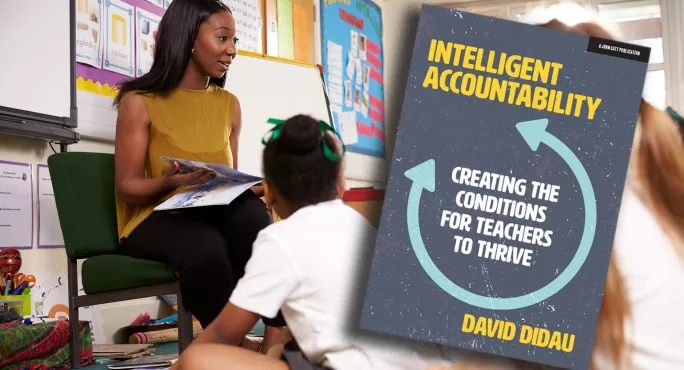Book review: Intelligent Accountability

Intelligent Accountability: creating the conditions for teachers to thrive
Author: David Didau
Publisher: John Catt Educational
Details: 312pp; £15.00
ISBN: 978-1913622275
Public debate about accountability is often blunt: should we have more or less of it? Do we put the interests of pupils or teachers first? Who is to blame?
In this provocative read, David Didau successfully moves the debate on, to consider how we can have better, more intelligent accountability.
The descriptions of the pernicious effects of unintelligent accountability felt familiar, and I suspect they will resonate with anyone working in schools. Didau convincingly argues that widespread accountability processes result in teachers trying to look their best, rather than to do their best.
This is an uplifting read with a clear, coherent vision. The emphasis is firmly on how schools can improve accountability, rather than who is to blame for existing practices. As I read Intelligent Accountability, two things became clear: Didau’s profound understanding of schools, and his affinity for teachers - even those hardest to love.
In the introduction, he cautions readers that his ideas may irritate them. For me, Intelligent Accountability felt as though it was somewhere between a conversation with a precocious sixth-former and Dominic Cummings’ blog. The integration of eclectic research evidence with smatterings of philosophy and popular science both charmed and irritated me.
What is intelligent accountability?
Intelligent accountability sounds wonderful - like free coffee in the staffroom, extra PPA time and the abolition of yellow board pens. Who could be against it? However, the book does more than just try to appease teachers. The argument is nuanced and worth scrutinising.
Didau delicately builds his argument on three foundations. First, he shows that we likely know less than we think, so we need to embrace uncertainty.
Next, we explore the surplus model of school improvement that assumes all teachers are well intentioned and trying their hardest. Rather than apportion blame, it seeks to unearth the underlying reasons for problems. This model aims to create the conditions in which our most precious resource - teachers - can thrive.
Finally, we are told to trust teachers, at least until they give us reason not to trust them.
Didau argues that accountability is intelligent if three conditions are met:
- Teachers know they will be held accountable before decisions are made.
- Teachers do not know the views of people holding them to account.
- Teachers believe that those holding them to account are well informed and interested in accuracy.
From these simple principles, many things flow. Contrary to widespread practice, Didau’s principles suggest that sharing criteria for marking, planning or lesson observations is unhelpful as it violates the second condition that the views of people holding teachers to account are unknown.
If teachers know what school leaders “want”, then teachers inevitably end up trying to game the system, rather than using their best judgement.
If the ideas about improving accountability were not challenging enough, there’s a final kicker: the tension between equality, fairness and autonomy.
Didau argues that treating every teacher equally is unfair. Treating teachers fairly means giving them the support and freedoms they need to be most effective: some teachers need more support and fewer freedoms.
Instead, he advocates what we might call a risk-based approach to accountability, where “low-risk” teachers are given more freedom than their peers who are yet to earn the trust of school leaders.
Personally, I think this approach holds a lot of promise, but implementing it may be a leadership headache.
Squeezing insight from limited evidence
The existing evidence about accountability is limited, yet Didau does an admirable job squeezing every insight from it to provide sensible suggestions. The inferences are mostly convincing, but I needed more persuading. This is a common challenge in education: how do we proceed when we have very limited evidence?
I could not help wondering what Didau himself would have made of his choice to offer sensible suggestions. A recurring citation in Intelligent Accountability is to Didau’s blog critiquing a research report that highlighted the dearth of evidence about written marking before making reasonable recommendations.
At the time, Didau criticised the decision to give specific guidance based on very limited evidence. Arguably, we know a lot more about marking than we do about performance management, yet the report’s recommendations seem modest in comparison to Didau’s compelling vision and wide-ranging recommendations for improved accountability.
In both cases, I think the solution is greater transparency about the quality of evidence supporting each recommendation.
My three takeaways from the book are as follows:
- Intelligent accountability is hard, but the prize is considerable: better schools as places of learning and work.
- Redirecting our energies from proving to improving teaching quality is likely a better use of everyone’s time.
- Intelligent teacher accountability without intelligent school accountability is a big ask for school leaders.
I highly recommend you read this book. Better yet, give it as a gift to a senior colleague.
Thomas Martell is a science teacher and research school director. He tweets @Martell_Tom
Register with Tes and you can read two free articles every month plus you'll have access to our range of award-winning newsletters.
Keep reading with our special offer!
You’ve reached your limit of free articles this month.
- Unlimited access to all Tes magazine content
- Save your favourite articles and gift them to your colleagues
- Exclusive subscriber-only stories
- Over 200,000 archived articles
- Unlimited access to all Tes magazine content
- Save your favourite articles and gift them to your colleagues
- Exclusive subscriber-only stories
- Over 200,000 archived articles